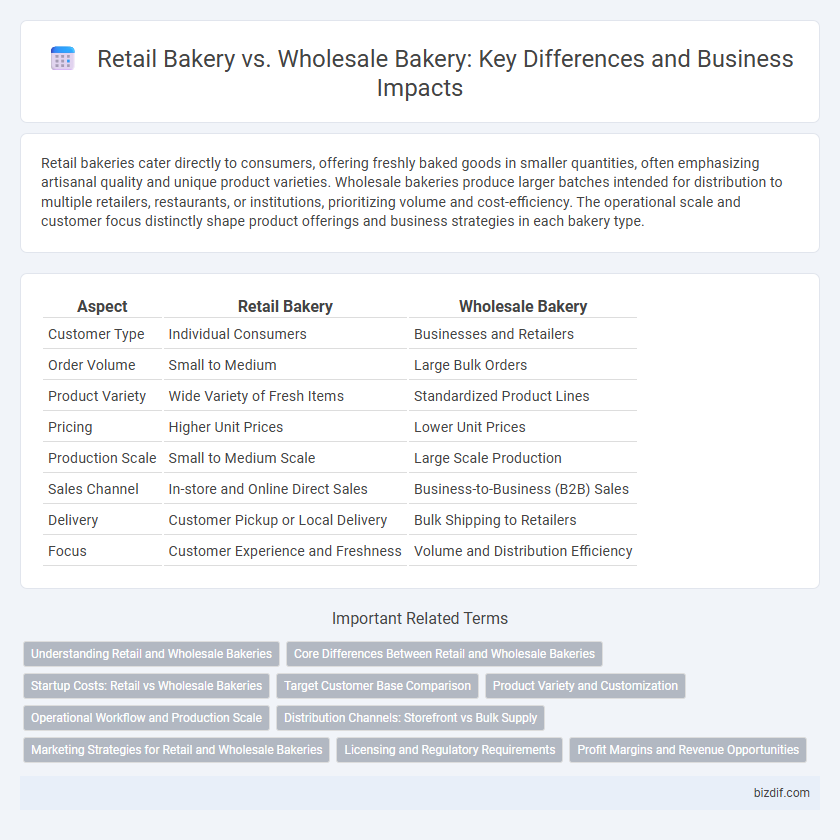Retail bakeries cater directly to consumers, offering freshly baked goods in smaller quantities, often emphasizing artisanal quality and unique product varieties. Wholesale bakeries produce larger batches intended for distribution to multiple retailers, restaurants, or institutions, prioritizing volume and cost-efficiency. The operational scale and customer focus distinctly shape product offerings and business strategies in each bakery type.
Table of Comparison
| Aspect | Retail Bakery | Wholesale Bakery |
|---|---|---|
| Customer Type | Individual Consumers | Businesses and Retailers |
| Order Volume | Small to Medium | Large Bulk Orders |
| Product Variety | Wide Variety of Fresh Items | Standardized Product Lines |
| Pricing | Higher Unit Prices | Lower Unit Prices |
| Production Scale | Small to Medium Scale | Large Scale Production |
| Sales Channel | In-store and Online Direct Sales | Business-to-Business (B2B) Sales |
| Delivery | Customer Pickup or Local Delivery | Bulk Shipping to Retailers |
| Focus | Customer Experience and Freshness | Volume and Distribution Efficiency |
Understanding Retail and Wholesale Bakeries
Retail bakeries cater directly to consumers, offering freshly baked goods in small quantities with personalized service and immediate purchase options. Wholesale bakeries produce large volumes of baked products destined for distribution to retail outlets, restaurants, and institutions, emphasizing bulk production and consistent quality. Understanding the distinction helps businesses optimize production, pricing strategies, and target market approaches within the bakery industry.
Core Differences Between Retail and Wholesale Bakeries
Retail bakeries focus on direct consumer sales, offering a wide variety of fresh, ready-to-eat products in smaller quantities, often with personalized customer service and on-site purchases. Wholesale bakeries produce large volumes of baked goods, supplying products in bulk to businesses like supermarkets, cafes, or restaurants, emphasizing efficiency, consistency, and cost-effectiveness in large-scale production. Key differences include target customers, order sizes, pricing structures, and operational scale.
Startup Costs: Retail vs Wholesale Bakeries
Startup costs for retail bakeries typically include expenses for storefront rent, display cases, customer seating, and point-of-sale systems, averaging between $50,000 and $150,000. Wholesale bakeries often require larger production facilities, industrial ovens, bulk ingredient purchases, and delivery vehicles, with startup costs ranging from $100,000 to $250,000. Retail bakeries focus on direct consumer sales which demand higher initial marketing and design investments, while wholesale bakeries prioritize scale and efficiency to supply multiple clients.
Target Customer Base Comparison
Retail bakeries primarily serve individual consumers seeking fresh, ready-to-eat products such as bread, pastries, and cakes for personal or family consumption. Wholesale bakeries target businesses like restaurants, cafes, supermarkets, and catering companies, providing bulk orders of baked goods at lower prices for commercial resale or use. The customer base distinction hinges on retail bakeries focusing on end-users while wholesale bakeries cater to B2B markets requiring larger quantities and consistent supply.
Product Variety and Customization
Retail bakeries specialize in a wide product variety, offering freshly baked goods directly to consumers with options for customization such as personalized cakes and specialty breads. Wholesale bakeries focus on bulk production, providing large quantities of standardized products with limited customization to meet the demands of businesses and retailers. The retail model emphasizes diverse, tailored offerings, whereas wholesale prioritizes efficiency and volume over product variety.
Operational Workflow and Production Scale
Retail bakeries focus on small-batch production with customized, high-quality baked goods tailored for direct consumer sales, maintaining hands-on operational workflows centered around freshness and variety. Wholesale bakeries operate on large-scale production lines, optimized for efficiency and volume, supplying bulk orders to retailers, restaurants, and institutions through streamlined, automated processes. The production scale in retail bakeries is limited by immediate consumer demand, whereas wholesale bakeries leverage industrial equipment to meet extensive market distribution requirements.
Distribution Channels: Storefront vs Bulk Supply
Retail bakeries primarily focus on storefront sales, offering freshly baked goods directly to individual customers, enhancing customer experience and brand loyalty. Wholesale bakeries emphasize bulk supply, distributing large quantities of products to supermarkets, restaurants, and other businesses through efficient logistics networks. Distribution channels in retail bakeries prioritize direct consumer interaction, while wholesale bakeries optimize volume sales and supply chain management.
Marketing Strategies for Retail and Wholesale Bakeries
Retail bakeries prioritize local community engagement and personalized customer experiences through social media marketing, loyalty programs, and in-store promotions to drive foot traffic and brand loyalty. Wholesale bakeries focus on B2B channels by leveraging direct sales teams, bulk order discounts, and trade show participation to build long-term relationships with cafes, restaurants, and grocery stores. Both bakery types benefit from strong branding and product differentiation tailored to their specific market demands.
Licensing and Regulatory Requirements
Retail bakeries must obtain local health permits and comply with food safety regulations tailored to direct consumer sales, including regular inspections and allergen labeling. Wholesale bakeries face more stringent federal and state licensing, as they supply multiple retail locations or businesses, requiring adherence to bulk production standards and traceability protocols. Both bakery types must ensure compliance with the Food and Drug Administration (FDA) and local health departments, but wholesale operations often require additional certifications such as Good Manufacturing Practices (GMP) and Hazard Analysis Critical Control Point (HACCP) plans.
Profit Margins and Revenue Opportunities
Retail bakeries typically achieve higher profit margins per product due to direct consumer sales and the ability to charge premium prices for fresh, artisanal goods. Wholesale bakeries benefit from larger volume sales, generating greater overall revenue but often operate with thinner margins because they sell at lower prices to retailers and distributors. Effective pricing strategies and cost control are essential for both models to maximize profitability in the competitive bakery industry.
Retail Bakery vs Wholesale Bakery Infographic

 bizdif.com
bizdif.com